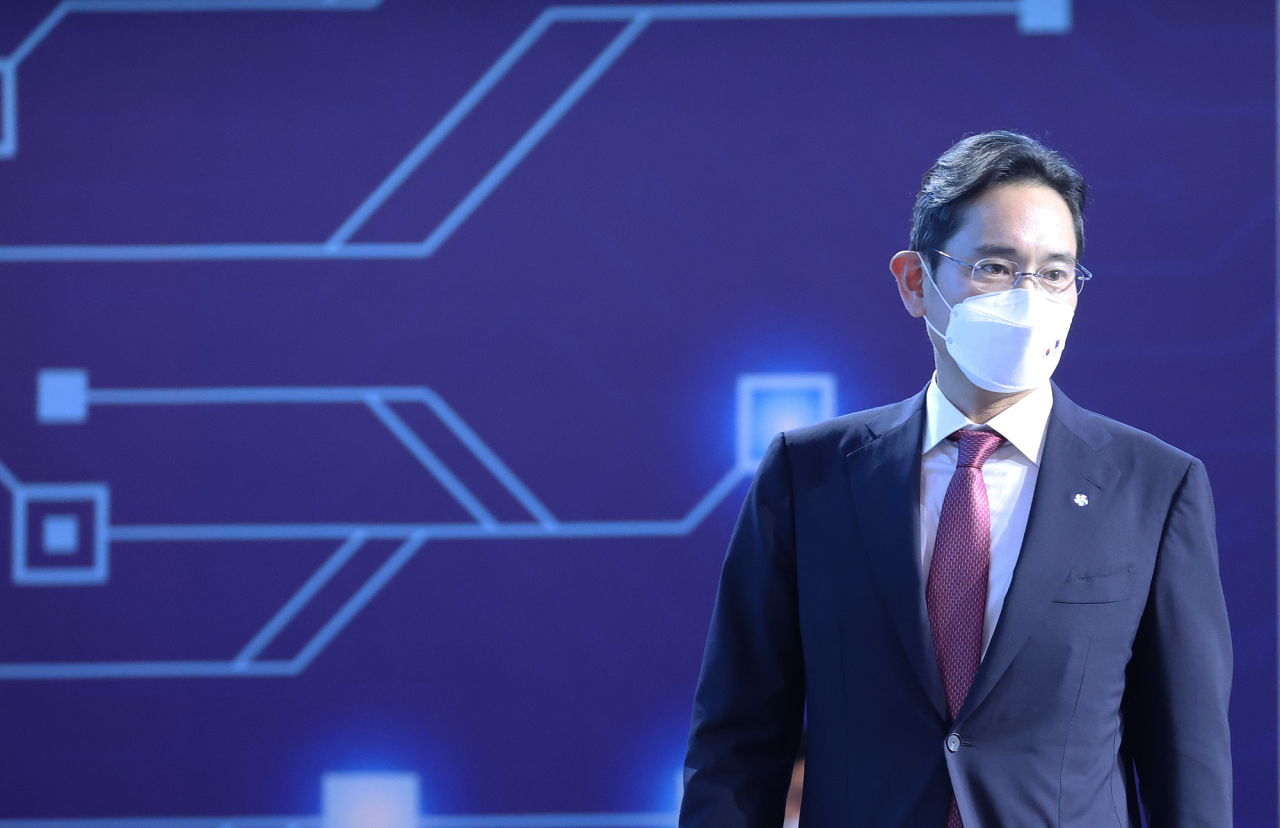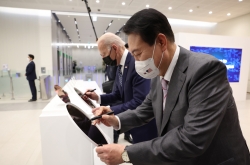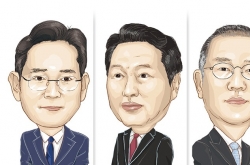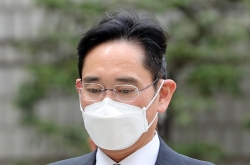South Korea’s largest conglomerate Samsung announced Tuesday plans to invest a combined 450 trillion won ($355.8 billion) and create some 1 million jobs in Korea over the course of five years -- the largest ever in the group’s history -- in order to maintain its competitive edge and navigate uncertainties.
Samsung also chose chip design, foundry and biotechnology as the major three pillars of its future growth in its investment guidance.
The groupwide plan is expected to set the stage for the early arrival of the world‘s most advanced technologies in the fields of semiconductors, biotechnology, artificial intelligence and telecommunications.
The size of the five-year spending will grow 30 percent compared with that of the previous five years. Of the total investment commitment, 360 trillion won will go to South Korea, according to the company.
The group’s crown jewel Samsung Electronics will use the fresh capital to strengthen research capabilities and introduce more sophisticated technologies in the chip design and manufacturing process.
Samsung Electronics, the second-largest chip contract manufacturer in the world, will move to narrow its gap with Taiwan-based foundry giant TSMC with the gigantic spending. Samsung plans to use gate-all-around field effect transistor technology used for contract manufacturing chips that are thinner than 3 nanometers by the end of 2022. Samsung also aims to unveil a plan to mass produce 3-nanometer chips within the first half.
Also with the spending, Samsung will devote itself to developing next-generational chips for supercomputers, robots and other AI use cases, ranging from high-definition image sensors to chips that enable communication under 6G standard and low-power application processors.
As for its DRAM chip business, which Samsung has taken the top spot in global market share for the past three decades, it will widen the application of the extreme ultraviolet lithography process to improve production of cutting-edge chips. Samsung began mass producing the 14-nanometer memory chip using EUV photolithography in October.
The technology will take the place of the existing photolithography technology using argon fluoride. Samsung said in the statement that the decision is a preemptive move to keep itself ahead of the race with competitors in China and the United States.
Beneficiaries of the investment will not be limited to Samsung‘s chip business. Its contract-based drug manufacturing operations will be boosted by the spending to expand production capacity, while its pipeline of biosimilar products will be diversified. Also, Samsung looks to push for the arrival of a 6G communication standard, believed to be 50 times faster than the world’s most-advanced 5G standard in theory.
These plans are expected to nurture a combined 1 million jobs for the tech giant and its vendors, according to Samsung. This includes Samsung‘s own plan to hire some 80,000 employees in the next five years.
This comes amid external uncertainties posed by Russia‘s invasion of Ukraine and the supply chain disruption caused by the tug-of-war between the US and China, which have highlighted the need for “economic security.” US President Joe Biden in his first-ever state visit to Korea chose a chip production line of Samsung Electronics in Pyeongtaek, Gyeonggi Province as his first destination. He was accompanied by Samsung Electronics Vice Chairman Lee Jae-yong, signifying the need for closer ties between countries in the global fight over chips and other technologies.
Meanwhile, the guidance follows that of 2021, when Samsung unveiled a 240 trillion won investment plan in three years from 2021 to expand its footprint in semiconductors, biopharmaceuticals, AI and robotics in the wake of the post-pandemic era. The plan was unveiled immediately after the group’s de facto leader Lee Jae-yong was released from prison on parole.
Lee is currently on trial over his alleged role in the controversial merger of Samsung’s de facto holding company Samsung C&T and Cheil Industries.
Samsung Electronics’ share price fell 2 percent Tuesday, while Samsung Biologics, a biotech arm, was 1.3 percent lower.
Experts say it is nothing new for business groups to lay out investment plans when a new president takes office. But the plans can still be seen as extraordinary because they are considerably large and have come earlier than expected, given the unfavorable conditions such as supply chain disruptions and bearish stock market.
“Business circles normally refrain from announcing investment pledges in uncertain times,” Park Ju-gun, CEO of business intelligence company Leaders Index.
“The announcements demonstrate the willingness of the (Yoon) administration and business circles to gather strength to overcome challenges. It appears that the two have reached a consensus as to what needs to be accomplished.”
Another expert noted that the conglomerates who made investment announcements have something in common -- they are trying to expand their footprints in the US.
The plans can be interpreted as a response to Biden’s state visit to Korea, in an apparent signal to attract investment from Korean business groups in the US, said Kim Sang-bong, economics professor at Hansung University.
“Their investment in Korea will follow, aligned with that of the US,” Kim added.
By Son Ji-hyoung (
consnow@heraldcorp.com)


![[Market Eye] Will Lee Jae-yong’s return revitalize Samsung?](http://res.heraldm.com/phpwas/restmb_idxmake.php?idx=605&simg=/content/image/2022/05/08/20220508000156_0.jpg)






![[Herald Interview] 'Trump will use tariffs as first line of defense for American manufacturing'](http://res.heraldm.com/phpwas/restmb_idxmake.php?idx=644&simg=/content/image/2024/11/26/20241126050017_0.jpg)


![[Herald Review] 'Gangnam B-Side' combines social realism with masterful suspense, performance](http://res.heraldm.com/phpwas/restmb_idxmake.php?idx=644&simg=/content/image/2024/11/25/20241125050072_0.jpg)
![[Health and care] Getting cancer young: Why cancer isn’t just an older person’s battle](http://res.heraldm.com/phpwas/restmb_idxmake.php?idx=644&simg=/content/image/2024/11/26/20241126050043_0.jpg)